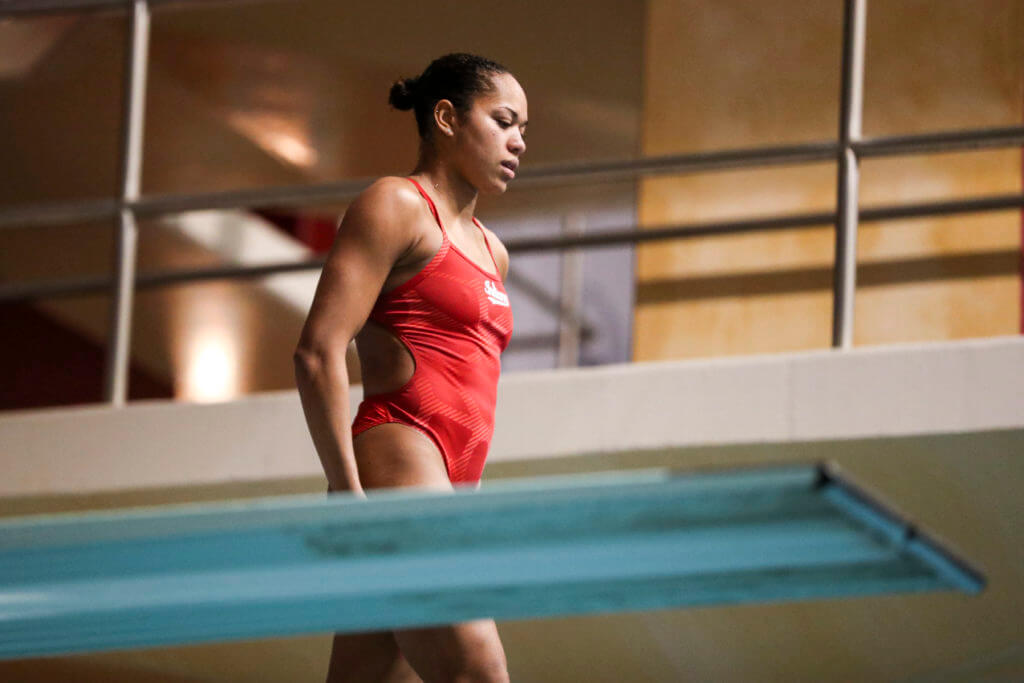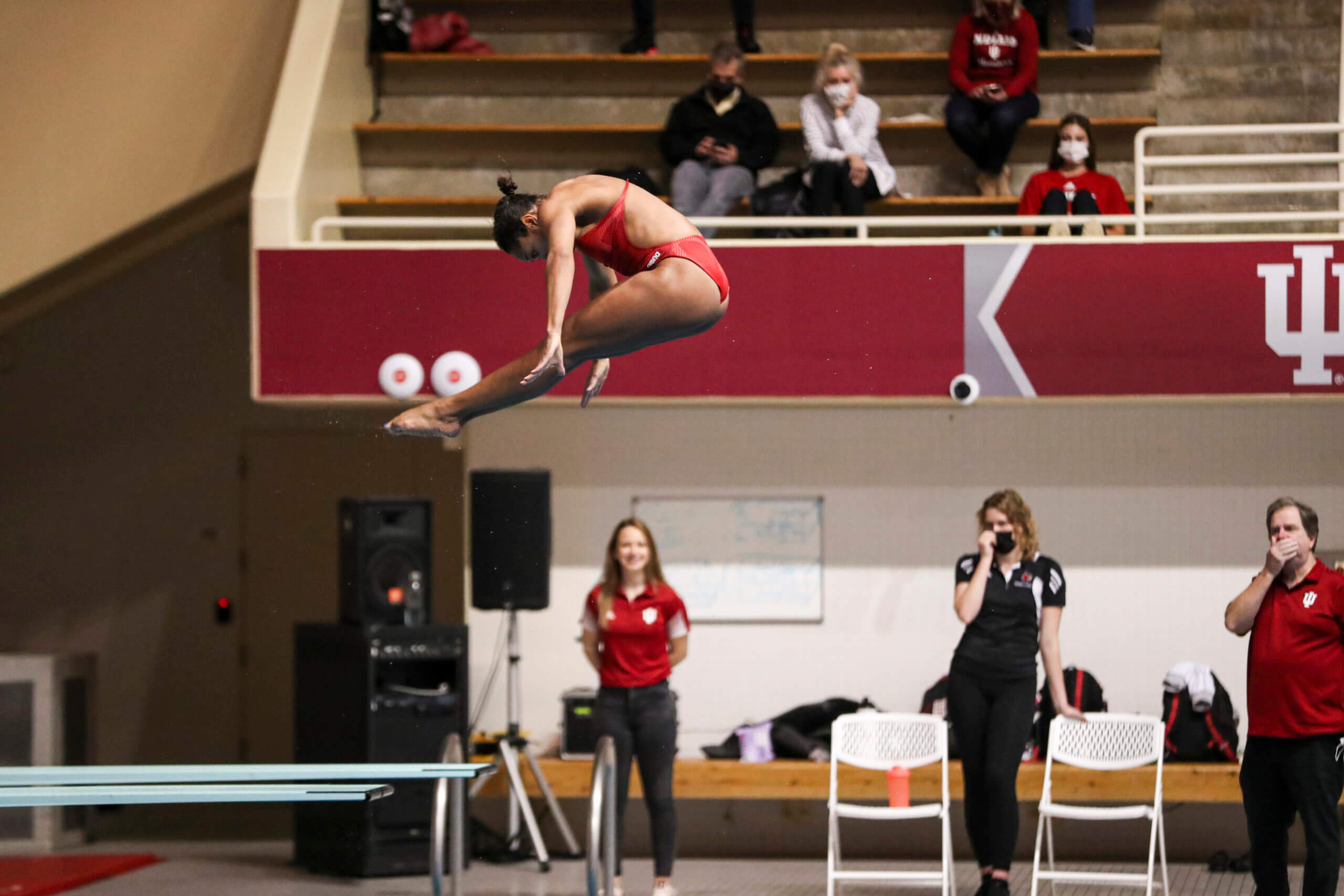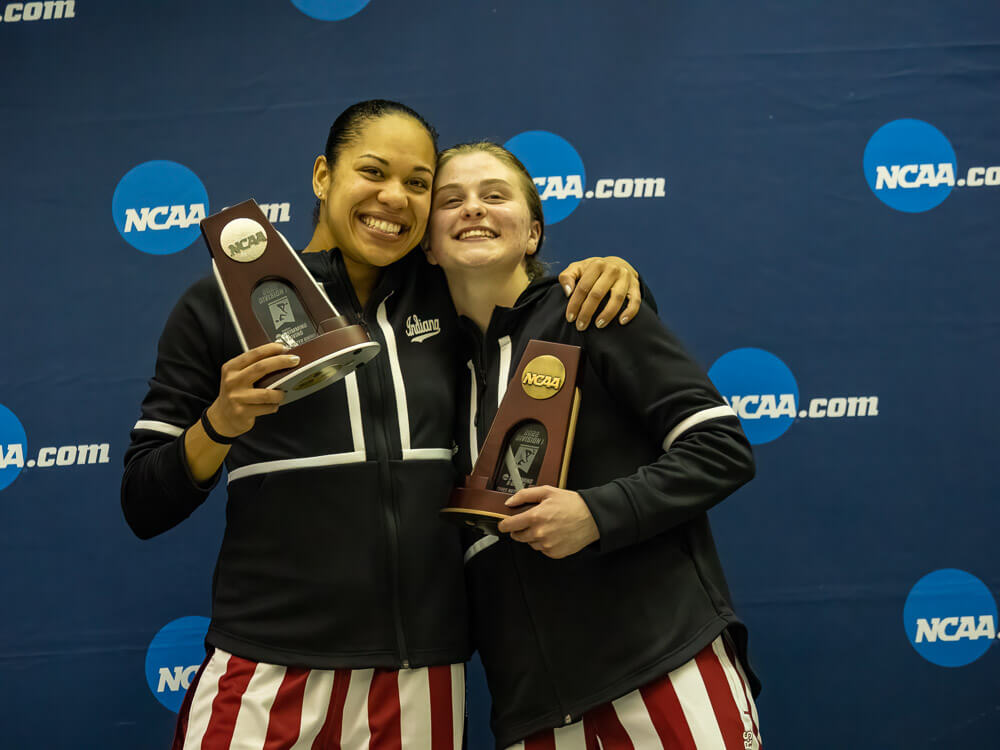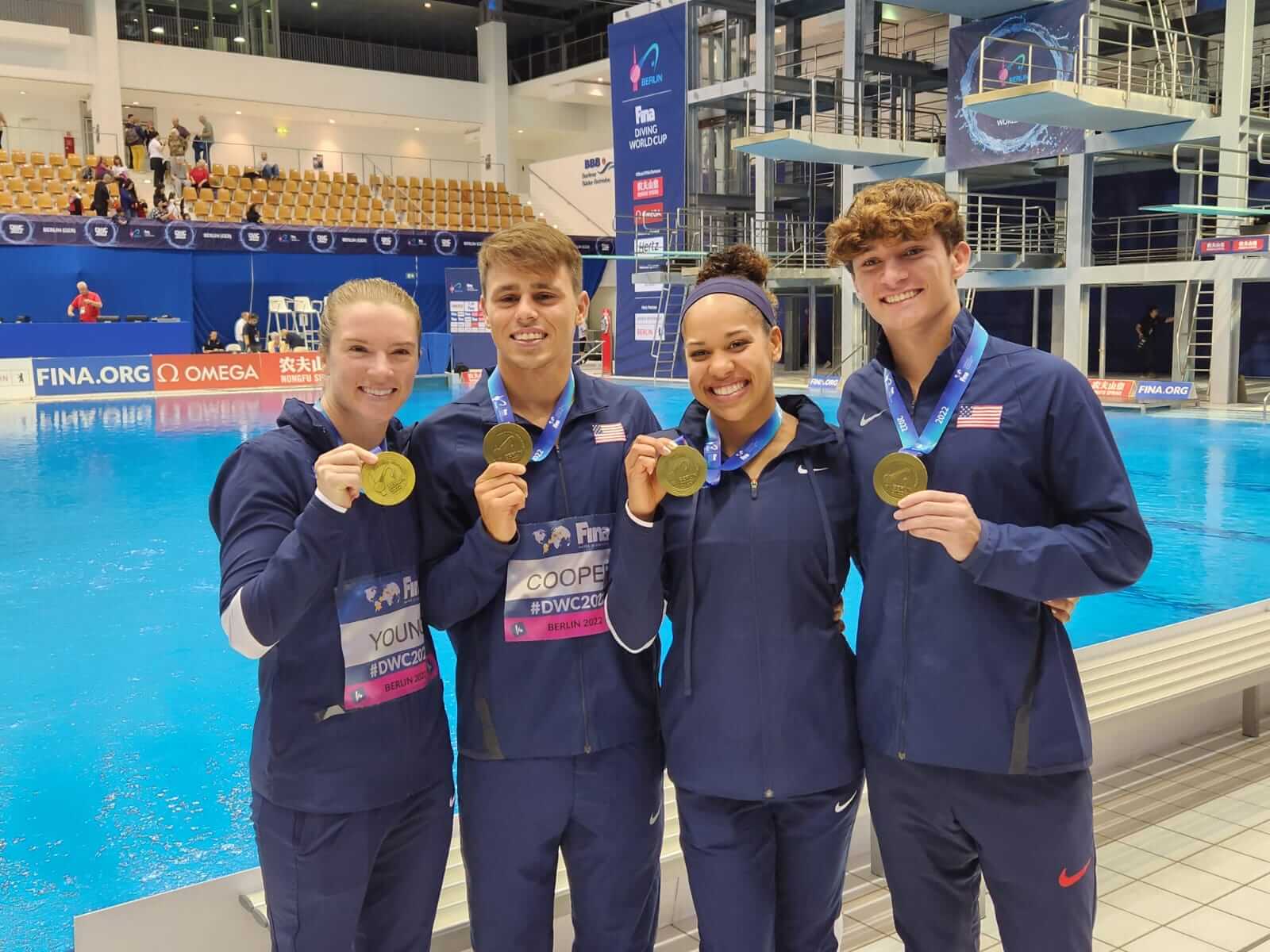Kristen Hayden Embracing Role as American Diving Pioneer

Kristen Hayden Embracing Role as American Diving Pioneer
Kristen Hayden’s intense focus doesn’t leave room for many what-ifs. Yet one looms in the background of everything she has achieved in her diving career.
What if, Hayden has pondered plenty, she hadn’t been steered in the direction of diving? What if the suggestion hadn’t been made to her mom by a fellow parent that maybe the precocious and athletic kid – with aptitude in the pool and in gymnastics, with energy to burn in dance classes – give diving a try?
That hypothetical, from the outside at least, has certain clear answers. New Jersey and North Carolina would’ve had different high school diving champions, in 2013 and 2015, respectively. NCAAs would’ve had a different silver medalist on 3-meter springboard last spring. Christina Loukas would still hold the Indiana dual-meet record on 3-meter. USA Diving might still be without a Black female national champion, might still not have been represented at a World Championship by a Black woman.
For the laser focus on her craft, Hayden is conscious of these alternative pathways. The trail that she has blazed imposes a responsibility as she enters the postgraduate phase of her career. She doesn’t shy away from being one of the few Black faces in an overwhelmingly white sport, using that as fuel to become the best diver she can be.
“I always I wanted to dive to influence, but now it’s even bigger because the amount of comments and messages I’ve received saying, ‘hey I have a Black daughter and she looks up to you, she wants to get into diving, she watches your videos, she just loves seeing what you do,’” Hayden told Swimming World recently. “It’s really a thing of inspiring the next generation coming up and trying to make diving a more diverse place. That’s huge for me.”
Hayden has grown that profile as the Paris Olympics near. Her progress in the last three years has her squarely in the conversation to dive onto the next Olympic team. Whether she gets there or not, her auspicious (and long overdue) firsts for Black divers have already crafted a significant legacy.
Diving In
Hayden’s pioneer role fits the trait the defines her approach on the board: A willingness to push outside her comfort zone in the pursuit of continual improvement. That characteristic has propelled her career through home bases in five states and into the international scene.
Hayden group up as a sports omnivore. She played soccer, ran cross country and swam, in addition to gymnastics and dance classes. (Her brother, Jon, played baseball at Johns Hopkins.) She was 10 when a fellow summer swim league parent, remarking in passing about Hayden’s interests in the pool and gymnastics, suggested to her mom that they might meld on the diving board.
So began Hayden’s diving journey. She started high school at the Lewis School in Princeton, N.J., where she won an NJSIAA title as a freshman in 2013. An ankle injury robbed her of a postseason as a sophomore, but already, she’d spied the ceiling of where her home could take her. High-level club diving was in short supply in central New Jersey, her parents shuttling her two hours each way to West Chester Diving Club outside of Philadelphia for two hours of instruction three days a week. If she wanted to go all-in on the sport, a change of scenery was needed

Kristen Hayden; Photo Courtesy: Andrew Mascharka/Indiana Athletics
The family made the jump in 2015 to North Carolina, where Hayden trained with Duke Diving Club. She won a state title with Panther Creek High School – her score of 507.55 remains an NCHSAA Class 4A record. As a senior though, she opted out of the high school season for an immersive seven-month stint at RipFest Diving in Indiana, to prep for the summer. That 2016 season would prove a watershed: Hayden finished second on 3-meter in the junior competition of the AT&T National Championships, improving from 17th the previous year and earning a spot at Junior World Championships. At that summer’s senior competition, held during the Rio Olympics without some of Trials’ top performers, she captured second on 1-meter and third on 3-meter and platform.
The performance opened her eyes as to what the intensive preparation of an environment like RipFest could do.
“I felt so prepared,” Hayden said. “I felt overprepared, which was just awesome. The coach there really changes your mindset as in, you don’t dive until you get it right, you dive until you can’t get it wrong. … By the time I was near the end of nationals, competing just became natural. I wasn’t even thinking, I was just diving. And having all those reps behind me, I was just like, ‘I know I can hit this dive.’”
Hayden had already signed with the University of Michigan, where she excelled as a freshman. She qualified for NCAAs in all three events, topping out at 11th place in platform. But Ann Arbor wasn’t quite the right fit, so she transferred for her sophomore season to Minnesota. Eleventh became her niche at NCAAs – on platform as a sophomore, with 14th on 3-meter, then again on 3-meter as a junior in 2019.
Given her 2016 jump in performance and the how she’d plateaued since – she finished no higher than seventh at Nationals from 2017-19 – she looked into her past as she eyed an Olympic redshirt season. If Hayden was going to make it to Tokyo, she reasoned, she needed the eat-sleep-and-breath immersion of RipFest for seven hours a day.
“In those two years, I’ve really started to listen to myself, listen to my body and know my purpose,” she said. “Not that I didn’t know my purpose in 2019, but in this past season, I took nutrition a lot more serious. Every single day I was at practice I started making intentions on what I should focus on.”
One year became two, thanks to the Olympic postponement. And Tokyo wasn’t in the cards, Hayden finishing fourth on 3-meter and fifth in 3-meter synchro with partner Margo O’Meara. But every day, she felt herself improving, which only fueled a competitive fire that needs no stoking.
Back to Basics
Even without the Olympic berth, Hayden sees Olympic Trials in 2021 as a success. Her results since make it look like an inflection point.
The primary emotion was gratitude, from being in the stands in 2016 to being in the thick of the chase five years later. She also got to watch training partner Tyler Downs qualify for Tokyo, which filled her with joy and a shot of confidence.
“It was just unreal,” she said. “… It was so exciting, and watching my teammate make the team was definitely the best part. He had two dives left and we were crying because we were so happy for him. We know all the hard work that goes into it, and just to see someone that we’re so close with that we’ve been training together with for the past two years make one of those spots, it was just unbelievable.”
Hayden’s post-competition euphoria had her ready to be back at practice the next Monday to embark on the next qualification cycle. A meeting with her coach led her to think better of that, but a little time off her freshened her mentally to devise a plan forward.
What she settled on was a back-to-basics approach, taking everything back to the most fundamental aspects, the foundational elements her peers were learning as eight-year-olds while she was off playing multiple sports. That process of “filling in the gaps,” as she puts it, would add technical artistry – reworking her pike holds, for instance, or the constant battle to point her toes – to the obvious strength that Hayden had used to muscle through for so long. Instead of her powerful style compensating for her being perhaps less graceful or dainty than some of her peers, improving her fundamentals would allow that strength to be in service of a more effortless execution.
“We had to rewrite all my technique because I wasn’t doing these dives correctly,” she said. “I was just so strong that I could muscle through it. But it was time to add the beauty to it.”
Hayden recognized a certain risk in that. She could’ve continued on her path toward a solid college career as comfortably one of the country’s best divers. Or she could court the discomfort of relearning things she’d done just fine a thousand times in a new way and endure so many little short-term doses of frustration in the hope of big long-term growth.
To Hayden, the decision was easy.
“I think rebuilding is frustrating, but since I know the purpose, you push through the frustration,” she said. “It’s just so great because when you’re rebuilding and you start getting those levels and you see it visually and your dive becomes more visually appealing and it becomes more beautiful, then you’re like, OK this is why I’m going through the frustration and figuring it out.

Indiana’s Kristen Hayden, left, and Tarrin Gilliland at 2022 NCAAs; Photo Courtesy: Peter H. Bick
“I know when I need to be able to hit, I can figure it out. But if my goal truly is to compete on the international stage and battle with the best of the best, I need to make these changes. I don’t even see it as really an option. If this is what you want, you have to go through these steps.”
The results have rewarded that faith. She spent her final year of eligibility at the University of Indiana and entered Bloomington with three major goals. She wanted to take down a school record, which she did by scoring 399.38 points to destroy Loukas’ Hoosiers dual-meet mark by a margin of 25 points. She wanted a medal at Big Tens, which she got with silver on 1-meter. And she wanted an NCAA trophy, garnered with a silver medal on 3-meter (plus ninth on platform and 12th on 1-meter).
That latter accolade brought things full circle. On the second step of the podium, Hayden stood between gold medalist Sarah Bacon, her former synchro partner and Minnesota teammate, and bronze-winner Tarrin Gilliland, her IU teammate.
“Just us standing up there together was everything,” Hayden said of her and Gilliland. “It was definitely one of the best moments of my career so far because we train together, we push each other, we root for each other and we’re up there standing second and third together with our candy cane striped pants together. It’s awesome.”
National results followed. The highlight was historical, at the 2021 Winter National Championships, fittingly enough at Bloomington’s Counsilman-Billingsley Aquatics Center. In her first meet partnered with IU teammate Quinn Henninger, they captured the 3-meter mixed synchro title, Hayden becoming the first Black woman to win a U.S. diving championship and first to compete at a World Championships for the U.S. She also finished second at that meet in the women’s 3-meter synchro, paired with O’Meara, and third in the individual 3-meter event.
“It just was so perfect,” she said. “It was such a perfect moment. My family was there, my friends, my teammates, with a teammate, competing against teammates at our home pool.”
Hayden earned trips to the World Championships last summer in Budapest in all three events, finishing 13th individually, eighth with Henninger and seventh in the women’s 3-meter synchro, paired with Brooke Schultz. She netted a pair of medals from a FINA World Cup stop in Berlin this fall, her and Schultz getting 3-meter synchro bronze while also being part of the mixed team event winners.
Beyond the board
Hayden has long been used to pushing through barriers. Being one of the few elite Black divers in America is just one aspect.
Hayden attended Lewis School after being diagnosed with a central auditory processing disorder, an inability to understand spoken language without an underlying hearing loss. The school specifically caters to students with a suited of “language-based learning differences.” A communications studies major, she’s become an advocate for children with learning differences and has spoken at global conference about her experience. She’s a founding member of USA Diving’s Diversity, Equity and Inclusion Council.

From left, Zachary Cooper, Katrina Young, Kristen Hayden and Tyler Downs, after winning gold in the mixed team event at the 2022 FINA World Cup in Berlin; Photo Courtesy: USA Diving
Her physique sets her apart from many of her peers: “I do stand for showing that you can be muscular, you can have strong legs, broad shoulders and still produce beautiful dives,” she said.
She also knows that the sport is always progressing. Increases in strength training mean that the staid image of divers as being build like gymnasts is evolving. Technique and strength, at the level she’s aspiring to, is no longer an either/or proposition. (Hayden often invokes the example of Serena Williams who merged elite skill with strength and speed never before seen on a women’s tennis court, as an avatar.) Hayden’s success can shake up stale perceptions of diving, which is part of her objective.
“Women are powerful,” she said. “I don’t want us to think of women as just being dainty and light. We can be strong. We can be powerful. We can be a force to be reckoned with, and that’s the drive behind my image and what I’m trying to bring to the sport.”
Whatever transpires in the year-plus to Paris, Hayden understands her career is about more than just her. It’s a responsibility she willingly shoulders.
“When I go into the pool, whenever I’m down, just remember that I’m doing this for more than just myself,” she said. “I want to do this to of course be the best version of myself that I can be but also to inspire future generations and have young girls be inspired by my story and say, hey I want to try diving. Because I didn’t have that.”

- EVENT PAGE
- SCHEDULE
- VENUE
- STREAMING INFO
- DAY 1 PRELIMS RESULTS
- DAY 1 FINALS RESULTS
- DAY 2 PRELIMS RESULTS
- DAY 2 FINALS RESULTS
- DAY 3 PRELIMS RESULTS
- DAY 3 FINALS RESULTS
- DAY 4 PRELIMS RESULTS
- DAY 4 FINALS RESULTS
- DAY 5 PRELIMS RESULTS
- DAY 5 FINALS RESULTS
- DAY 6 PRELIMS RESULTS
- DAY 6 FINALS RESULTS
- DAY 7 PRELIMS RESULTS
- DAY 7 FINALS RESULTS
- DAY 8 PRELIMS RESULTS
- DAY 8 FINALS RESULTS
- DAY 9 FINALS RESULTS




Nice article about a person being on a new path, blazing a trail for others to learn things that may be possible for them as well.
I’ve not met Ms. Hayden, but I think I saw her this weekend in a setting which seemed to give further depth to her persona. She is not just breaking onto new levels in her own desired experience pathway, she is willing to pay tribute to the tradition and accomplishments of those going before her.
You mentioned her training at the Counsilman-Billingsley facility in Bloomington, Indiana. This weekend a Celebration of Life was held on the IU campus for Hobie Billingsley, who once won 7 consecutive national diving coach of the year honors at IU and coached multiple Olympic medal winning men AND also women before the advent of Title IX. He had passed this July at age 95. Over 180 admirers signed up to attend.
One of the eulogizers at the main weekend event was Drew Johansen, the current and only third ever IU diving coach. Johansen is in his 10th year (’13– ), following Hobie’s 31 years (1959-1989) and Jeff Huber’s 24 years (’89-13). Johansen brought with him a crew of 13 current Indiana Varsity and Pro Group divers, male and female, willing to the honor the tradition of the man who started their program 65 years earlier, well before any of them were born, though I suspect many of the current crop of divers knew Hobie personally, as he remained visible at his namesake facility even well into his 10th decade. Coach Johansen had his current charges stand and be recognized as those carrying on Billingsley’s passion; all were proudly adorned with newly printed versions of t-shirts worn for over a half century. The large print on their backs identified them as members of HOBIE’S HEROES.
I’m quite sure Ms. Hayden was seated two tables away from me. As I said, I do not know her, but she was striking in a way that made her stand out from the crowd. She exuded style and grace, making her distinct from the rest, characteristics of useful value not only on the boards but when down from them as well. After reading your article about the types of forward steps Kristen has taken, I am convinced at the impression I had when this generation of divers, including her, stood in honor of Hobie, her forward steps have also been tempered by full and solid appreciation of the efforts of those who preceded her.
May your accomplishments and sense of success continue to grow, Kristen.
Love this article! Kristen personifies focus, passion, dedication and also grit, resilience and grace! I know her and her family well and they are so special!